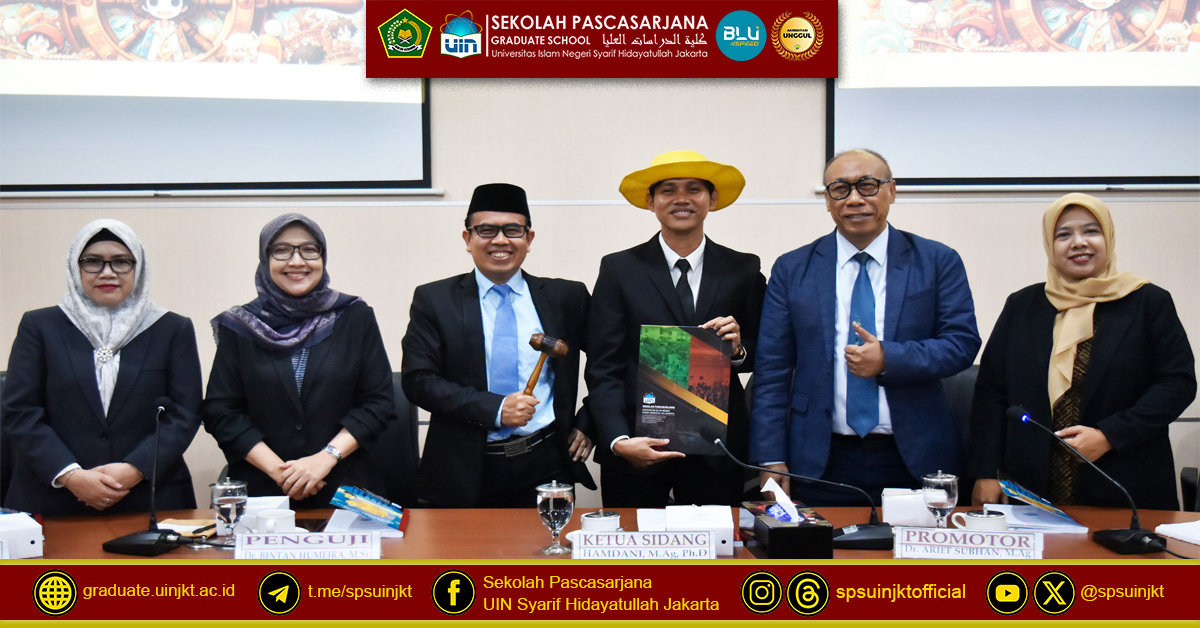Elfarditma Gasam's Thesis Test, Revealing the Depth of Ethics in the Adventure of the One Piece Pirates
SPs Theater Room UIN Jakarta, SPs NEWS: The Graduate School of Syarif Hidayatullah State Islamic University Jakarta held the 2772nd Thesis Exam in the SPs Theater Room of UIN Jakarta, on Tuesday, July 29, 2025 with candidate Elfarditma Gasam.
Elfarditma is a student of the Master of Islamic Studies study program with a concentration in Da'wah and Communication. Elfarditma wrote a thesis titled "Ethical Values in the One Piece Anime and Its Reception for Nakama"
This research not only identifies ethical values, but also delves into their relationship to Islamic ethical principles and how "Nakama" is a term for One Piece fans to accept and apply these values in their daily lives. Using a descriptive qualitative approach, Gasam applies Walter Fisher's narrative paradigm theory, Uses and Gratifications theory, and Stuart Hall's media reception to analyze the complexity of the relationship between narrative, audience, and values.
The data of this research was obtained through in-depth observation of key episodes of One Piece, especially in the Alabasta Arc which is rich in moral conflicts and ethical dilemmas. Not only that, in-depth interviews with members of the South Tangerang One Piece Community (KOPTAS) are also a primary data source to understand the audience reception directly. This combination of methodologies provides a comprehensive overview of the impact this anime has had on its fans.
The results of Gasam's research show that One Piece is rich in personal ethical values such as responsibility, sincerity, optimism, and honesty. Furthermore, the anime also highlights strong social ethical values, including friendship, cooperation, and concern for others. Interestingly, these findings also reveal that overall, the ethical values contained in One Piece have significant similarities to ethical values in Islam, indicating the existence of a potential cultural bridge.
For the Nakama, One Piece is not just a spectacle, but has three dimensions of deep entertainment meaning: affective (emotional), cognitive (understanding), and escapism (escape from reality). In the context of the reception of ethical values, the majority of fans are in a dominant position and negotiated decoding, which means they accept the message in its entirety or adapt it to their personal and social context. The response to these values has also been very positive, inspiring concrete actions such as the spirit of unyielding and social solidarity, although there have been criticisms related to elements of violence, open clothing, and behavior that is considered incompatible with Islamic values.
This study underscores that anime, with its massive audience, especially among teenagers, has great potential as an effective means of da'wah. Through touching storylines and strong characters, anime is able to convey moral messages in depth, influencing the emotional, cognitive, and behavioral aspects of its audience. This is a breakthrough in understanding popular media as a character-building tool.
Elfarditma Gasam's innovative findings further strengthen previous studies, such as those conducted by Anugrah (2022), which shows that popular media, including anime, play a crucial role in shaping individual values and characters, especially when interpreted critically. This thesis not only provides new insights for the academic world, but also opens up important discussions about the role of entertainment media in shaping societal morals.
Elfarditma Gasam successfully defended her thesis under the guidance of Dr. Arief Subhan, M.Ag, and tested in front of a board of examiners consisting of Hamdani, M.Ag, Ph.D, Dr. Arief Subhan, M.Ag, Dr. Rubiyanah, MA and Dr. Bintan Humeira, M.Si.
After paying attention to the thesis writing, the comments of the examiner team and the candidate's answers, the examiner team determined that Elfarditma Gasam graduated with the predicate of Very Satisfactory. Elfarditma Gasam is the 2772nd master in the field of Islamic Studies, in the master's program of the Graduate School of UIN Syarif Hidayatullah Jakarta. (JA)

